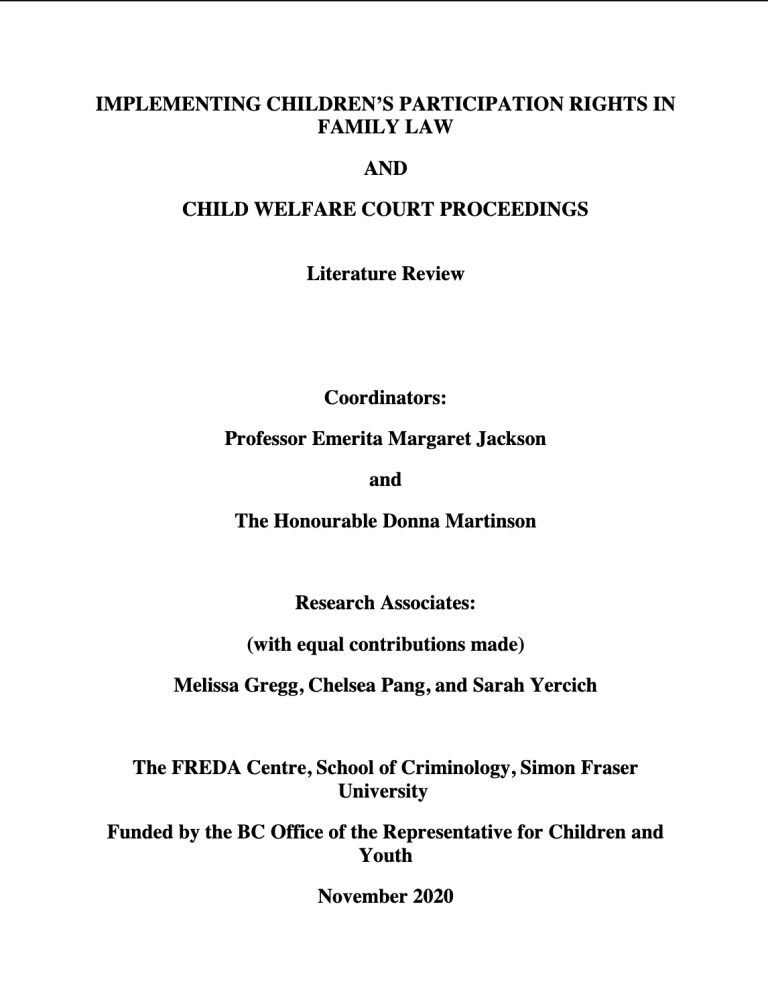4 search results
for
Non-profits and community organizations
Enhanced awareness and training
Education and training for legal professionals
Recommendation 5: The Canadian legal system also requires specialised training of professionals working with children, including mental health professionals, lawyers, and judges (Bala & Birnbaum, 2019; Collins, 2019; Paetsch et al., 2018). This is particularly important for legal professionals working on cases involving parental alienation and/or family violence (Elrod, 2016; Martinson & Jackson, 2016). These types of cases require judges and mental health professionals who are experienced in discovering and addressing problems in the family, as there can be multiple reasons for a child refusing contact with a parent or guardian, including family violence that can continue to put the child at risk if left unaddressed in custody and access decisions (Elrod, 2016; Martinson & Tempesta, 2018).Specific recommendations for children’s legal counsel include: ensuring democratic communication, in which lawyers and child both share information about themselves to build trust in preparation for proceedings; having lawyers inform children about the court process and what it means to have a lawyer represent them; having lawyers pose questions to children to better recognize how children understand the court process; and getting lawyers to emphasize flexibility in the child’s options to share their views, not share them at all or change their instructions to the lawyer (Bala & Birnbaum, 2019; Koshan, 2020; Horsfall, 2013; Paetsch et al., 2018). Those working at family courts should receive specialised training on family violence and high-risk cases, which can have a substantial impact on children’s rights (Koshan, 2020; Martinson & Raven, 2020a). From a scholastic perspective, much more research is needed to understand which of the many strategies implemented across Canada (and the world) might be most helpful to children’s legal participation (Birnbaum & Saini, 2012). This requires ongoing cooperation and collaboration between the legal and academic communities, to guarantee specialised and sensitised approaches to this topic.
-
Category and theme:
- Access to justice ,
- Accessibility ,
- Accessible services and technology ,
- Ageism ,
- Courts ,
- Decolonization and Indigenous rights ,
- Discrimination and hate ,
- Human rights system ,
- Indigenous children and youth in care ,
- International human rights ,
- Policing and the criminal justice system ,
- Poverty and economic inequality ,
- Public services
Audience:
Groups affected:
Location of recommendation:
Increasing attention (and resources) must be given to children’s representation
Recommendation 7: Academic scholarship and policy papers focused on children’s rights to representation point to the need for increased funding from government sources, to provide consistent and dependable counsel for children (Bala & Birnbaum, 2019; Byrne & Lundy, 2019; Canadian Coalition for the Rights of Children, 2016; Collins, 2019). However, it is also notable that none of this literature provides specific guidance as to where extra funding should be sourced or how new programming may be implemented to maintain both efficient and effective legal assistance for children to facilitate the expression of their views in a legal setting. In particular, the CBA Alternative Report (2020) suggests that in B.C., absolutely no funding is set aside for children’s representation (p. 33). This is particularly problematic in relation to immigrant, refugee, and Indigenous children (CBA, 2020). This may be the case for two reasons: 1) an overall lack of resources (particularly given the current local and international economic climate in the wake of Covid-19 – see Garlen, 2020); and/or 2) a lack of awareness at the federal level of the critical importance of this issue, and the ‘domino effect’ of reduced rights for vulnerable populations. As a result, it is recommended that policy organisations focused on this issue work to demonstrate whether and how additional funding can be allocated to children’s legal representation. In New Zealand, for example, the Family Court (Supporting Families in Court) Legislation Bill forms part of a $62 million package that restores the right to legal representation at the start of a care of children dispute in the Family Court (Government of New Zealand, 2020, p. 1). Enhanced attention and funding at the federal level can only benefit both those organisations focused on this area, as well as beneficiary populations.-
Category and theme:
Audience:
Groups affected:
Location of recommendation:
Participation and representation generally
Protect and guarantee participation rights for children
Recommendation 8: Children’s rights, participation, welfare, and best interests are unquestionably interlinked. Children are persons with their own legal rights and must be guaranteed the right to participate in guardianship and family law proceedings (Grover, 2015; Martinson & Tempesta, 2018). Children’s rights to participate are in line with the UNCRC’s recommendations and FLA’s best interests provisions (Dundee, 2016), and work to safeguard and prioritize children’s voices and preferences about their own well-being.-
Category and theme:
Audience:
Groups affected:
Location of recommendation:
Participation and representation generally
Implement an empowerment-based approach to participation and representation
Recommendation 9: Development and cognitive functioning should not prohibit children’s participation in court proceedings, as this denies children their fundamental rights based on perceived functioning and undermines the UNCRC’s recommendations (Grover, 2014; Martinson & Tempesta, 2018). Instead, an empowerment-based approach must be adopted and implemented that promotes, prioritizes, and ensures children’s participation in guardianship and family law proceedings regardless of age or capacity. An empowerment-based approach would be child-centred and incorporate strategies that would ensure children’s participation regardless of age and/or capacity, including legal representation, judicial interviewing, VCRs, and child-inclusive mediation.-
Category and theme:
Audience:
Groups affected:
Location of recommendation:
